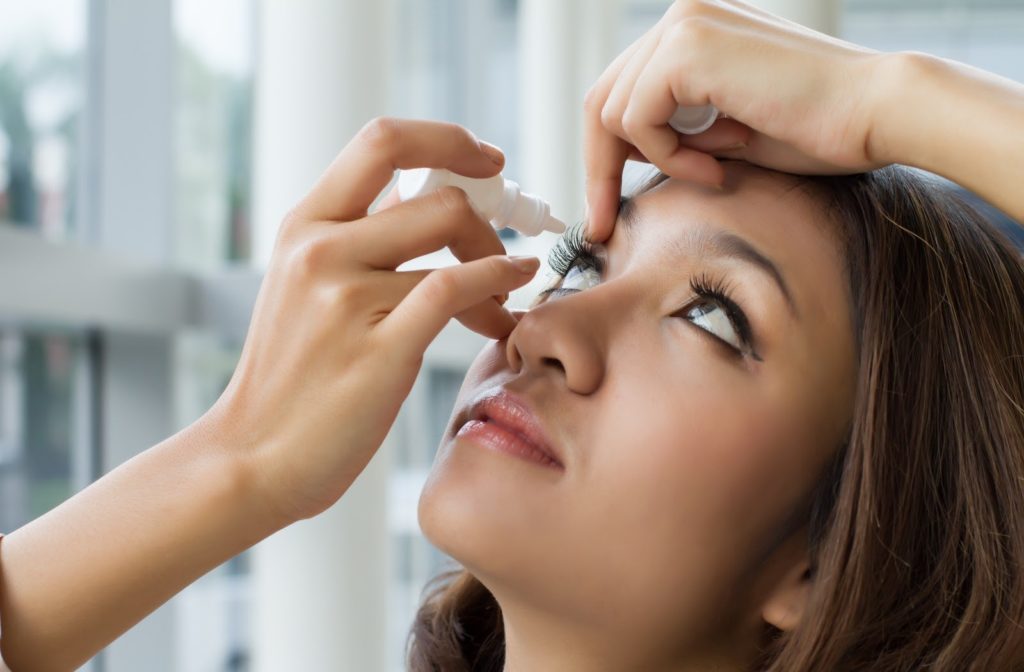If you’re suffering from dry eyes, it can be hard to determine the cause of your symptoms, especially during the springtime. With pollen, pet dander, and more allergens in the air, what’s causing your red and watery eyes? Learning the difference between dry eyes and allergies can help you know when to seek help from your optometrist.
Continue reading to learn more about dry eyes and allergies, including how you can tell which condition you’re experiencing.
What Is Dry Eye Disease?
Dry eye disease is a common and often chronic condition that affects nearly 30% of Canadians. Your tears help lubricate your eyes each time you blink, but complications can arise when there is instability within your tear film. Your tear film has 3 layers (oil, water, mucus) that work together to keep the eye’s surface moist and protected.
You may develop several uncomfortable symptoms when something is wrong with the tear film.
Dry Eye Disease Symptoms
Dry eye disease can cause several irritating symptoms to develop. While these symptoms don’t have long-term effects, they can affect your quality of life. Common signs of dry eye disease include:
- Eyes that burn
- Pain or discomfort
- Eye redness
- Watery eyes
- Stringy mucus around the eyes
- Eye fatigue
- Difficulty focusing on tasks
- Blurry vision
- A gritty feeling in the eyes
Dry eye symptoms can feel like a part of everyday life, but this condition can cause significant discomfort.
What Causes Dry Eyes?
Dry eye disease is a multifactorial condition, meaning there can be many reasons you experience dry and irritated eyes. In general, issues within the tear film cause your eyes to become dry. These issues typically occur due to decreased tear production, increased evaporation, or both.
Decreased Tear Production
Dry eyes can occur when your body cannot produce enough tears to lubricate your eyes. Tear production tends to slow down with age, but other factors can affect this production. Other possible causes of decreased tear production include:
- Certain medical conditions
- Certain medications
- Desensitized corneal nerves
Increased Tear Evaporation
Increased tear evaporation occurs when your tears dry too quickly, leaving the eye’s surface unprotected. This faster evaporation typically happens when the glands that produce oil for your tear film experience problems. These glands, your meibomian glands, can become blocked or clogged, leading to dry eyes.
Causes of increased tear evaporation include:
- Meibomian gland dysfunction
- Infrequent blinking
- Eyelid problems such as entropion & ectropion
- Eye allergies
- Preservatives in topical eye drops
- Wind, smoke, or dry air
- Vitamin A deficiency
Dry eye disease and allergies have several overlapping symptoms, so it’s no surprise if someone misinterprets dry eyes for allergies (or vice versa).
How Allergies Affect Your Eyes
Allergies can lead to dry eyes, known as allergic conjunctivitis. This irritation occurs when allergens make direct contact with the eyes. The risk of allergens may be seasonal or year-round, depending on what you’re allergic to.
Some potential triggers for allergic conjunctivitis include:
- Pet dander
- Pollen from trees, grasses, or weeds
- Diesel exhaust
- Dust mites
- Cigarette smoke
- Mould
- Perfume
You can develop several irritating symptoms when exposed to these allergy triggers. These symptoms include red, watery, burning, itchy, or puffy eyes.
Are You Experiencing Dry Eyes or Allergies?
If you’re suffering from dry eyes, it can be difficult to know whether it’s because of dry eye disease or allergies. With the many similarities these conditions have, it’s unlikely you can determine the cause of your irritation on your own. Visiting your optometrist is the best way to diagnose the cause of your dry eyes.
Remember Your Symptoms
To help your eye doctor diagnose your condition more quickly, document your symptoms. While dry eyes and allergies have many similar symptoms, they have specific differences.
Several allergy symptoms are not present in dry eye disease, such as:
- Itchiness
- Eyelid swelling
- Under-eye circles
Keeping an eye on which symptoms you’re experiencing can help your optometrist more easily diagnose the cause of your dry eyes. The treatments they recommend will vary depending on the cause of your irritation.

Dry Eye & Allergy Treatments
Relieving the symptoms of dry eye disease and allergies requires different methods. Your allergy symptoms typically resolve with time once you remove yourself from the allergen and avoid repeated exposure. Other treatments may include cold compresses, artificial tears, and antihistamines.
Dry eyes can be more complicated. The most effective treatment depends on your unique needs. Several treatment options can help relieve your symptoms, including:
- Medicated eye drops & ointments
- Artificial tears
- Compresses
- Eye masks
- Nutrition & diet adjustments
- Environmental changes
Your optometrist will recommend the treatments they feel are most effective for your dry eye situation.
Don’t Live With Dry Eyes
No matter the cause of your dry eyes, you don’t deserve to live with this discomfort. You can improve your quality of life with help from your optometrist. They can recommend effective treatments after completing a comprehensive eye exam.
Book an appointment if you’re experiencing symptoms of dry eye disease or allergies.


